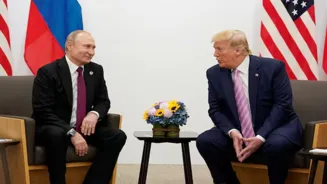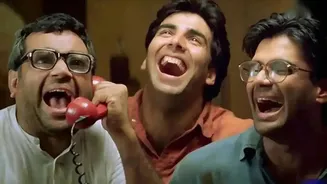This will be their second bilateral summit after Helsinki in July 2018, when Trump had contradicted US intelligence agencies by giving Putin a clean chit on his meddling in the US presidential elections of 2016. The two had also met on the sidelines of the Hamburg G20 summit (July 2017) and the Da Nang APEC summit (November 2017), marking their high-stakes, high-visibility global diplomacy.
But, for the first time, Trump’s approach to the Alaska summit echoes the World War II vintage of Munich and Yalta realpolitik as he reverts the focus to that era when territorial mandates were cruelly parcelled like chessboard pieces. As for Putin, other than breaking out of his prolonged isolation, this will certainly be his opportunity to explore newer fault lines in Western unity.
Echo of WWII Realpolitik
In 1938 Munich, Britain, France and Italy had conceded Sudetenland of Czechoslovakia to Germany in the name of avoiding war by appeasing Adolf Hitler. Later in 1945, the Yalta Conference saw Roosevelt and Stalin dividing Germany into four occupation zones, setting the ‘Curzon Line’ as the eastern border of Poland and granting the Japanese Kurile Islands to Russia, thereby sowing seeds for future conflicts.
Now, Trump’s suggestion of “swapping of territories” between Ukraine and Russia for the “betterment of both” reminds us of World War II realpolitik reborn and repackaged in Trump’s instinctive, intuitive, impatient style. Such ‘high-politics’-driven land-for-peace formulas fundamentally treat centuries-old communities as bargaining chips, especially so when millions of those people face occupation or displacement and thousands have already been killed.
This drive for ‘peace’ at the expense of ‘justice’ echoes the same old missteps that have seen the largest numbers of nations continuing to fight for their disputed boundaries. Instead of repeating World War II tragic precedents, therefore, post-colonial nations like India have no choice but to stand on the side that seeks to ensure that history’s victims aren’t disenfranchised for the nth time.
Ukraine’s Exclusion
At the very outset, Ukraine, the very nation whose fate will be under discussion at this Alaska summit, stands sidelined. President Zelenskyy has warned that peace forged without involving Kyiv is a “dead decision”. His constitutional mandate forbids ceding land to the aggressor, and only the national legislature has the power to determine national boundaries.
In a statement on Saturday, France, Italy, Germany, Poland, the UK and the European Commission stressed that no lasting resolution can be imposed “without Ukraine” at the summit. But Trump has not just agreed to exclude Ukraine but also ignored his European allies who have lately been busy crafting their own support base for Kyiv. They may now end up being asked to simply monitor a ceasefire ordered by this Putin-Trump summit.
Most likely, the rearranging of Ukrainian territories without consulting Ukraine and announcing a unilateral Russian pledge for a temporary ‘ceasefire’ may be presented as this summit’s first step towards a fait accompli peace. Even if the White House manages to invite President Zelenskyy to join the summit on its sidelines, thereby improving its legitimacy, it will still remain fraught with Trump’s underlying premise of territorial swaps that defies Ukrainian constitutional propriety.
In the alternative scenario, the summit may end up as unresolved, still with typical Trump touting success and Putin securing some visibility, while Ukraine digs in for more years of conflict. In this case Ukraine’s European allies and nonaligned nations like India will have a chance to prevent any outcome that undermines the sanctity of sovereignty and territorial integrity, thereby limiting this summit to a wish list of non-binding communiqués.
India’s Strategic Autonomy
India’s strategic autonomy has so far managed to navigate this complex multipolar geopolitics: withstanding Trump’s tirades while maintaining a deep strategic partnership with Putin. India has publicly welcomed the summit as a positive sign amidstworsening global equations. The summit echoes Prime Minister Modi’s credo: “This is not an era of war.” So, in either case of its failure or success, India has nothing to lose, though degrees of its role and gains remain contested.
First and foremost, India endorsing this summit underscores its persona as a responsible global actor committed to a fair and just peace without taking sides. Prime Minister Modi has continued nudging both Putin and Zelenskyy into initiating peace talks while providing humanitarian assistance to Ukrainians. India’s traditional commitment to peace and respect for national sovereignty can position it as a mediator-in-the-making.
It is in India’s interest that the Putin-Trump summit opens up pathways for Ukraine to be eventually welcomed into such talks. In that scenario, India can offer its good offices as an impartial and unbiased agency and align with forces advocating for an inclusive peace. In the midst of India’s growing tariff tensions for its purchase of discounted Russian oil, such continued direct US engagement with Russia should lower the tempers and give a fresh start and a positive spin to India-US trade talks and a possible trade deal.
Conversely, even if the minus-Ukraine Putin-Trump deal freezes or formalises the Russian-occupied Donbas region, even then India’s emphasis on the affordable and reliable energy narrative will invite lesser critical scrutiny. Such an outcome will be a win for President Putin, who will visit India for their annual summit before the end of this year, and such an outcome from the Putin-Trump summit will further boost Indo-Russian ties.
India’s Subtle Nudge
There are voices in America today that believe New Delhi can use its “influence” to help Trump in ending the Ukraine war and that it will be “consequential” for Indo-US ties. But as of now, the likely outcome from the Alaska summit is ordained to be less than decisive. It may be less about maps and more about messaging. On the positive side, it may strive hard but may not resurrect ghosts of World War II realpolitik, though it also may not achieve any forward movement towards any piecemeal path to peace that respects Ukraine’s agency.
India must continue to stand on the side that seeks to guard against repeating Munich and Yalta. History’s lesson is clear: without all the parties to conflict at the table, any agreement risks sealing injustice. In such uncertain times, India’s nuanced global posture of proactive neutrality stands to gain greater recognition as it continues to nudge for an inclusive peace that endorses the sanctity of national sovereignty and territorial integrity of all parties to conflict. The Putin-Trump summit in Alaska, therefore, can at best become their first step towards a long journey.
The author is professor of International Relations at Jawaharlal Nehru University, New Delhi. Views expressed in the above piece are personal and solely those of the author. They do not necessarily reflect Firstpost’s views.













